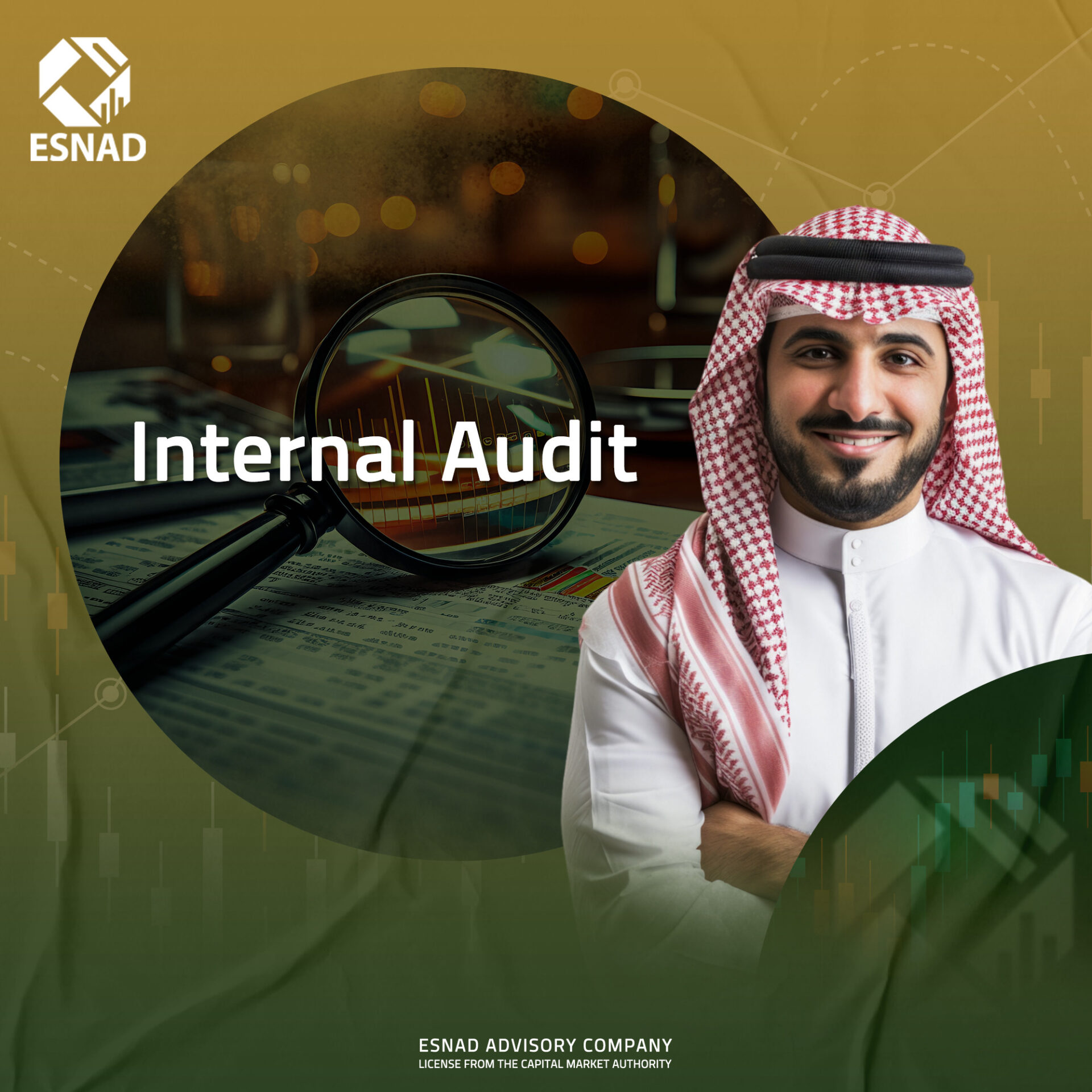Internal Audit
Concept of internal audit
An independent and objective activity that provides assurances and advisory services with the aim of adding benefit to the organization and improving its operations. This activity helps in achieving the organization’s objectives by following an organized, systematic approach to evaluate and improve the effectiveness of governance, risk management, and control processes.
Includes ministries, government agencies and institutions.
Includes businesses, both family and public, and non-profit institutions.
It includes employees, beneficiaries, customers, and suppliers.

Do everything possible to protect the company’s assets and property, and increase awareness among the company’s management in order to raise the efficiency and effectiveness of internal control for everything related to the financial and administrative aspects of the organization.
Follow up on the operations taking place in the organization and ensure that there are no violations in accounting operations through adherence to the recognized financial and regulatory laws and controls and applying them to all financial and accounting records in the organization.

Detecting fraud, deception, forgery, and accounting fraud, which lead to misleading those to whom financial statements are presented, resulting in incorrect decisions being made, and not disclosing any data that reveals forgery or financial fraud except after confirming its truth in order to arrest the perpetrators.
Establishing adequate financial control methods for all departments of the organization by the internal review and audit team, and emphasizing the necessity of following up internal audit work with caution, especially with important and vital departments.
Do everything possible to protect the company’s assets and property, and increase awareness among the company’s management in order to raise the efficiency and effectiveness of internal control for everything related to the financial and administrative aspects of the organization.
Follow up on the operations taking place in the organization and ensure that there are no violations in accounting operations through adherence to the recognized financial and regulatory laws and controls and applying them to all financial and accounting records in the organization.
Detecting fraud, deception, forgery, and accounting fraud, which lead to misleading those to whom financial statements are presented, resulting in incorrect decisions being made, and not disclosing any data that reveals forgery or financial fraud except after confirming its truth in order to arrest the perpetrators.
Detecting fraud, deception, forgery, and accounting fraud, which lead to misleading those to whom financial statements are presented, resulting in incorrect decisions being made, and not disclosing any data that reveals forgery or financial fraud except after confirming its truth in order to arrest the perpetrators.
Ensure the implementation of the policies and plans established by the project’s senior management, evaluate them, express an opinion on them, analyze violations of those plans, and provide suggestions to avoid any future deviations...
Preventing fraud, forgery, tampering, and early detection of errors, which leads to enhancing confidence in the data and information contained in books and records.
Verifying the accuracy and reliability of accounting and statistical data in making important decisions.
Evaluating the performance of individuals and their ability to assume responsibility and carry out the tasks assigned to them, and making recommendations and suggestions to improve work methods.
Ensuring that the information presented to management is accurate, sufficient, realistic, and resulting from correct and proper documents, and this requires examining all project operations.
Verifying the existence of the facility’s assets and recording them correctly in the books, and ensuring that there are adequate protection methods for the project’s assets against loss, theft, and other risks.
Ensuring that expenses are spent for important and recognized purposes and ensuring that due revenues are collected.
Evaluating the efficiency of using resources and assets from an economic perspective to achieve the greatest possible administrative efficiency and productivity.
Ensure the implementation of the policies and plans established by the project’s senior management, evaluate them, express an opinion on them, analyze violations of those plans, and provide suggestions to avoid any future deviations...
Ensuring that the information presented to management is accurate, sufficient, realistic, and resulting from correct and proper documents, and this requires examining all project operations.
Preventing fraud, forgery, tampering, and early detection of errors, which leads to enhancing confidence in the data and information contained in books and records.
Verifying the existence of the facility’s assets and recording them correctly in the books, and ensuring that there are adequate protection methods for the project’s assets against loss, theft, and other risks.
Verifying the accuracy and reliability of accounting and statistical data in making important decisions.
Ensuring that expenses are spent for important and recognized purposes and ensuring that due revenues are collected.
Evaluating the performance of individuals and their ability to assume responsibility and carry out the tasks assigned to them, and making recommendations and suggestions to improve work methods.
Evaluating the efficiency of using resources and assets from an economic perspective to achieve the greatest possible administrative efficiency and productivity.














